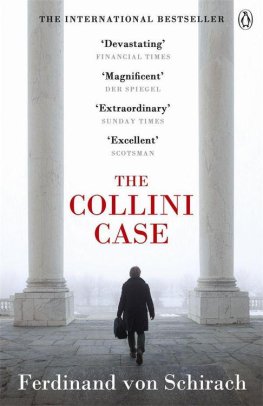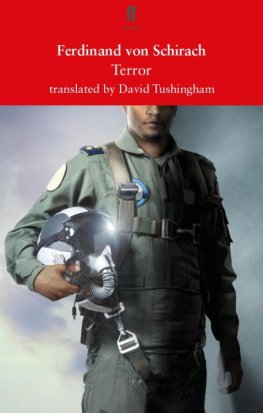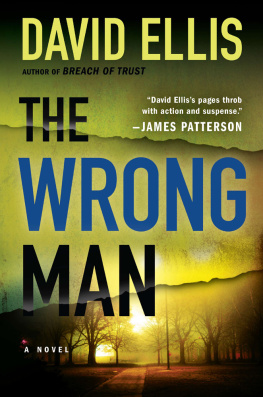Ferdinand von Schirach
THE COLLINI CASE
Translated from the German by Anthea Bell
We are probably all made for what we do.
Ernest Hemingway
Later, they would all remember it: the floor waiter, the two elderly ladies in the lift, the married couple in the fourth-floor corridor. They said the man was gigantic, and they all mentioned the smell of sweat.
Collini went up to the fourth floor. He checked the numbers. Room 400, the Brandenburg Suite. He knocked.
Yes? The man in the doorway was eighty-five years old, but he looked much younger than Collini had expected. Sweat was running down the back of Collinis neck.
Good evening. Collini from the Corriere della Sera. He mumbled slightly, wondering whether the man was going to ask him for his ID.
Yes, glad to meet you, come along in. We might as well do the interview here. The man offered Collini his hand. Collini flinched. He didnt want to touch him. Not yet.
Im sweating, Collini explained, and was angry with himself for saying so; it sounded odd. Its not the sort of thing you would say normally, he thought.
Yes, very sultry today, its going to rain soon, said the old man amiably, although he was wrong about the sultry atmosphere. These rooms were cool; you could hardly hear the air conditioning. They went into the sitting room of the suite: beige carpet, dark wood, large windows, all of it expensive and solid. Collini could see the Brandenburg Gate from the window. It seemed strangely close.
Twenty minutes later the man was dead: four bullets in the back of his head; one had been deflected inside his brain and come out the other side, taking half his face with it. The beige carpet soaked up the blood, a dark outline slowly spreading. Collini put the pistol on the table. He got down on the floor beside the man, stared at the age spots on the backs of his hands. He turned the body over with the toe of his shoe. Suddenly he brought the heel of it down on the dead mans face, looked at him and brought it down again. He couldnt stop, he kept grinding his heel into that face while blood and brain matter spurted over his trouser leg, the carpet, the bedstead. Later, the forensic pathologist couldnt reconstruct the number of times Collinis foot had trodden down as the bones of the dead mans cheeks, jaw, nose and skull cracked under the force of it. Collini didnt stop until the heel of his shoe came off. He sat down on the bed. Sweat was running down his face. His pulse took some time to calm down. He waited until he was breathing regularly again, then stood up, crossed himself, left the room and took the lift down to the ground floor. He was limping, because of the missing heel; the protruding nails scraped over the marble floor. In the lobby he told the young woman at the reception desk to call the police. She asked questions, gesticulating. All Collini said was, Room 400. Hes dead. Beside him, the electronic panel in the lobby announced: 23 May 2001, 8 p.m., the Spree Hall: Association of German Engineering Industries.
He sat down on one of the blue sofas in the lobby. The waiter asked if he could bring him anything; Collini did not reply. He stared at the floor. His footprints could be traced back over the marble paving of the ground floor, in the lift and all the way back to the suite. Collini waited to be arrested. He had waited all his life, and he had held his peace all that time.
Caspar Leinen here, on standby duty for legal aid. The display on his telephone showed a number from the criminal courts.
Tiergarten District Court, the names Khler, Im an examining magistrate. We have a suspect with no one to represent him. The public prosecutors office is applying for a warrant to arrest him for murder. How long will you need to get over here?
About twenty-five minutes.
Good, then Ill have our suspect brought up in forty minutes time. Come to Room 212.
Caspar Leinen ended the call. Like many other young defence lawyers, he had put his name down on the legal-aid rota. At weekends they were given mobiles and had to be ready if called upon. The police, the public prosecutors office and the magistrates had their numbers. If someone was arrested and wanted a lawyer, the authorities could call them. It was the way young defence counsels often got their first briefs.
Leinen had qualified forty-two days earlier. After the second of his two state law examinations he had taken a gap year, travelling around Africa and Europe, mainly staying with old friends from his boarding school. For the last few days his nameplate had been up by the entrance to the building: CASPAR LEINEN, LEGAL ADVISER. He felt it was rather ostentatious, but he liked it all the same. His chambers, two rooms, were at the rear of a building in a side street off the Kurfrstendamm. There was no lift clients had to climb a narrow staircase but at least Leinen was his own master, answerable only to himself.
It was Sunday morning and he had been sorting out the office for hours. There were open boxes everywhere, the visitors chairs came from a flea market, the metal filing cabinet was completely empty. His desk had been a present from his father.
After the magistrates phone call, Leinen looked around for his jacket. He found it under a pile of books. He took his new robe off the window catch, stuffed it into his briefcase and hurried off. Twenty minutes after the call, he was in the examining magistrates room.
Im Caspar Leinen, good morning. You phoned me. He was slightly out of breath.
Ah, from the standby legal-aid roster, right? Good, good. My names Khler. The magistrate stood up to shake hands. About fifty years old, salt-and-pepper jacket, reading glasses. He had an amiable, even absent-minded look about him. But that impression was deceptive.
The Collini murder case. Do you want a word with your client? Well have to wait for the public prosecutor anyway. Senior Public Prosecutor Reimers, the departmental head, is coming himself, even though its a weekend well, hes probably after a report. So do you want to speak to the man?
Yes, please, said Leinen. For a moment he wondered what could be important enough about this murder for Dr Reimers himself to come, but he forgot any such speculation when the police officer on duty opened a door. Right behind it was a very steep, narrow stone staircase. Prisoners were brought up these stairs from the cells to see the magistrate. A gigantic man was standing on the dimly lit first landing, leaning against the whitewashed wall, almost entirely blocking out the single ceiling light with his head. His wrists were handcuffed behind his back.
The police officer let Leinen through the door and closed it behind him. Leinen was alone with the huge man. Hello, my name is Leinen and Im a lawyer. There wasnt much space on the landing, and the man was standing too close.
Fabrizio Collini. The man gave Leinen only a brief glance. I dont need any lawyer.
Yes, you do. The law says that in a case like this you have to be defended by a lawyer.
I dont want to be defended, said Collini. His face was gigantic too. Broad chin, mouth just a straight line, prominent forehead. I killed the man.
Have you already said so to the police?
No, said Collini.
Then youd better go on keeping your mouth shut for now. Well talk when I know more about your file.
I dont want to talk. His voice was deep and sounded foreign.
Are you Italian?
Yes. But Ive been living in Germany for thirty-five years.
Shall I get in touch with your family?
Collini didnt look at him. I dont have any family.
Friends?
Theres no one.
Then lets start now.
Leinen knocked, the officer opened the door again. Senior Public Prosecutor Reimers was already sitting at the table in the conference room. Leinen briefly introduced himself. The magistrate took a file from the stack in front of him. Collini sat down on a wooden bench behind a low grating, with the police officer beside him.









